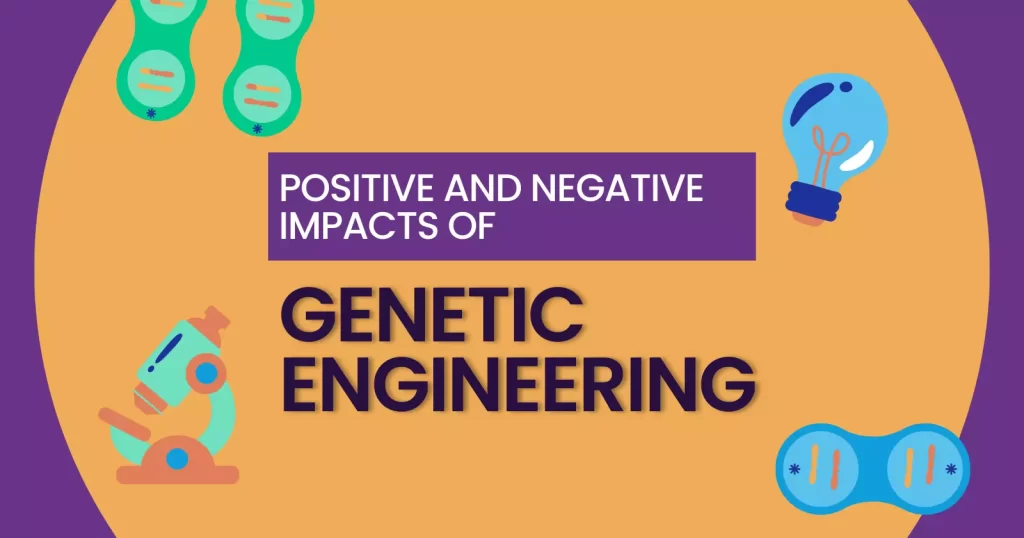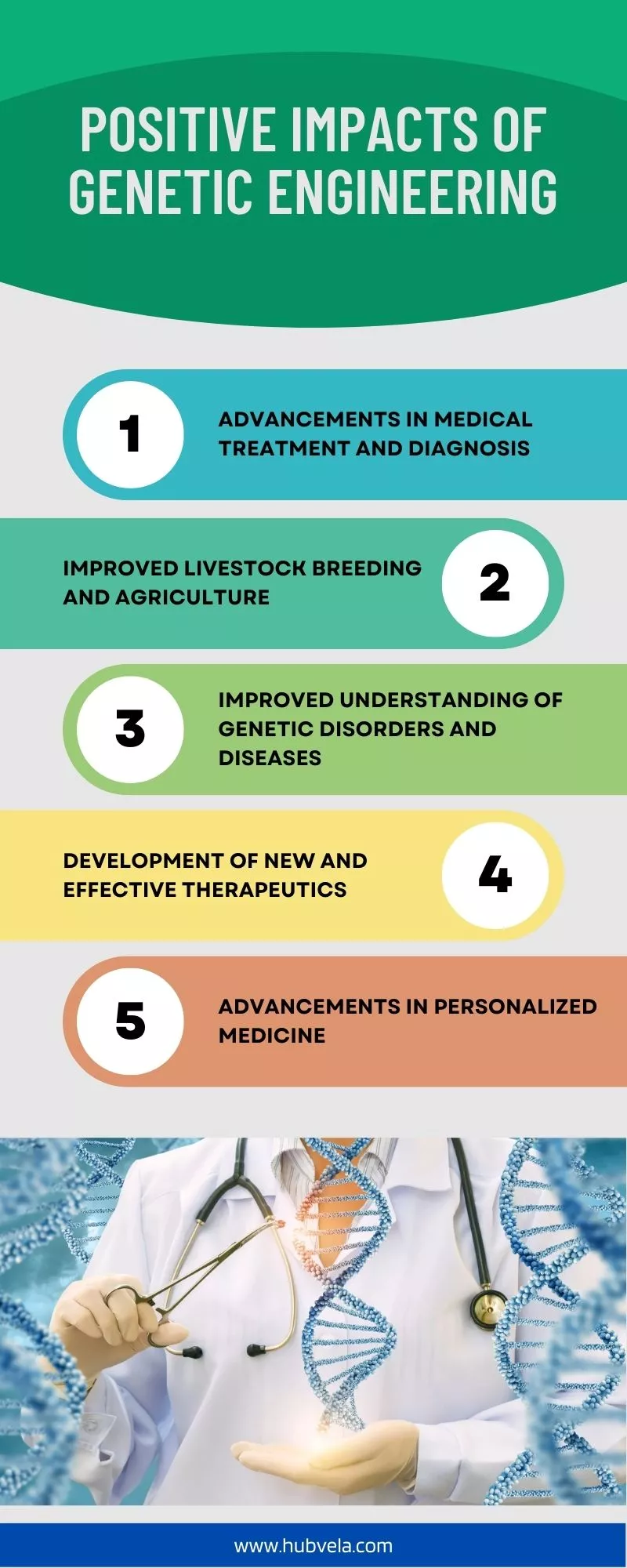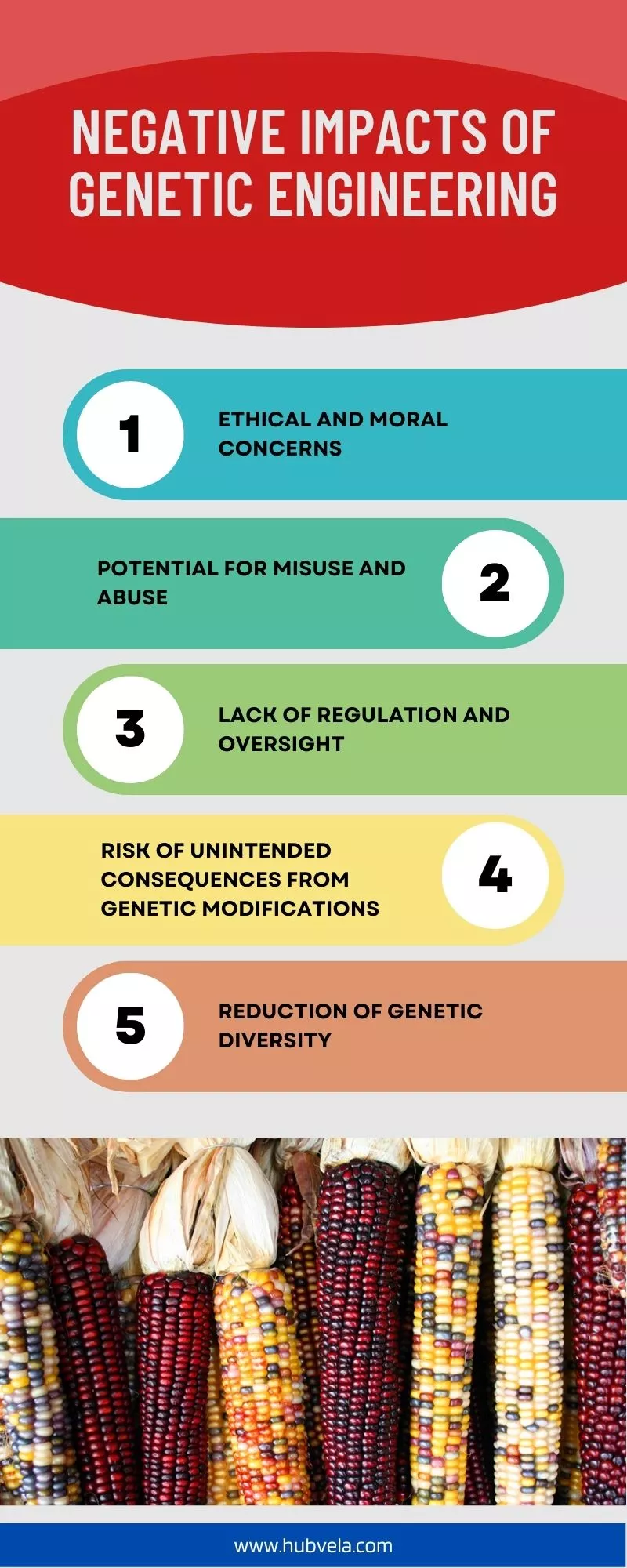Genetic engineering, the process of manipulating an organism’s genetic material to alter its characteristics, has been a topic of debate for decades.
While it has the potential to revolutionize medicine, agriculture, and other fields, it also raises ethical and environmental concerns.
In this article, we will explore the positive and negative impacts of genetic engineering, examining its potential benefits and drawbacks.
From the creation of genetically modified crops to the development of gene therapies, we will delve into the various applications of genetic engineering and its implications for society.

--Advertisement--
Positive Impacts of Genetic Engineering Technology
Genetic engineering, the process of manipulating an organism’s DNA, has been a topic of debate for many years.
While some may argue that it poses potential risks, there are also many positive impacts that cannot be ignored.
From improving the effectiveness and safety of drugs to the production of medically important products such as human insulin and growth hormone, genetic engineering has revolutionized the field of medicine.
It has also been used in agriculture to improve crop yields and provide resistance to pests and insects.
Additionally, modern genetic engineering is more gene-specific, which helps to avert the possibility of generating less desirable traits.
Furthermore, genetic engineering can have a positive effect on the climate by expanding the land area for agricultural production.
In this article, we will explore the various positive impacts of genetic engineering.

1. Advancements in Medical Treatment and Diagnosis
Genetic engineering has brought about significant advancements in medical treatment and diagnosis. Gene therapy and genetic engineering are two closely related technologies that involve altering the genetic material of organisms.
This technology has revolutionized medicine, leading to the development of new treatments for previously incurable diseases.
For instance, genetic engineering has enabled the production of insulin to treat diabetes.
Additionally, genetic engineering has allowed scientists to select one specific gene for the implant, avoiding the introduction of other genes with undesirable traits.
While there are ethical issues surrounding the genetic engineering of animals, the positive impacts of genetic engineering on human health cannot be ignored.
With continued research and development, genetic engineering has the potential to transform the medical field, providing new and innovative treatments for a range of diseases.
2. Improved Livestock Breeding and Agriculture
Genetic engineering has brought about many positive impacts on agriculture, particularly in the field of livestock breeding.
Through genetic improvement, livestock production has become more efficient and sustainable, leading to increased yields and better animal welfare.
Farmers are now able to use GMO crops to improve resistance to disease and pests, leading to higher crop yields and better food security.
Animal genetics is also important in providing people with a variety of products and services, including meat, milk, eggs, and draught power, in a wide range of environments.
Furthermore, genetic engineering can be used to remove characteristics that cause injury, such as selecting cattle without horns.
With the potential to transform how we improve livestock with genetics, genetic engineering is a promising tool that could be used to improve animal welfare while lowering the costs of production.
3. Improved Understanding of Genetic Disorders and Diseases
With the unlocking of the secrets of the human genome, we are now able to identify the genetic components of nearly all diseases, including those that are inherited from parents.
This knowledge has led to the development of genetic counseling services and the ability to diagnose genetic disorders earlier in life, allowing for better management and treatment of these conditions.
Additionally, genetic engineering has the potential to correct genetic mutations that cause diseases, offering hope for a cure.
Overall, the advancements in genetic engineering have provided us with a greater understanding of the human body and the potential to improve the lives of those affected by genetic disorders and diseases.
4. Development of New and Effective Therapeutics
Genetic engineering has brought about numerous positive impacts on the development of new and effective therapeutics.
With the advent of gene therapy, researchers have been able to target and treat genetic disorders at the molecular level, offering hope to patients who previously had no treatment options.
Additionally, the use of genetic engineering has led to the discovery of potential therapeutic peptides, which can be synthesized and modified to improve their efficacy.
In the context of the ongoing COVID-19 pandemic, genetic engineering has played a crucial role in the development of effective therapeutics.
Researchers have been able to identify and target specific viral proteins, leading to the development of monoclonal antibodies and other treatments that have shown promising results in clinical trials.
Moreover, the use of genetic engineering has also led to better relationships between clinicians and patients, which has been shown to lead to better outcomes.
By using feedback systems and other tools, clinicians can tailor treatments to individual patients, leading to more positive clinical change.
Overall, the positive impacts of genetic engineering on the development of new and effective therapeutics cannot be overstated.
As technology continues to advance, we can expect even more breakthroughs in the field of genetic engineering and its applications in medicine.
5. Advancements in Personalized Medicine
By analyzing an individual’s genes, doctors can identify certain drugs that may be dangerous or completely ineffective for them, and they can calculate personalized dosages that match their DNA.
This field of medicine, also known as precision medicine, tailors decisions concerning disease prevention, diagnosis, and treatment to individual patients based on information derived from genetic and genomic data.
While there are challenges to be addressed, such as reimbursement for personalized medicine products and clarity in regulation, the potential benefits are immense.
Precision medicine allows doctors to select treatments based on a genetic understanding of the patient’s disease, and to create personalized treatment plans.
Seminal advances have also been witnessed with studies demonstrating the key relevance of interactions between tumor cells and their microenvironment and the boom of immune checkpoint inhibitors.
With continued research and development, personalized medicine has the potential to revolutionize healthcare and improve patient outcomes.
Negative Impacts of Genetic Engineering
While it has the potential to bring about significant benefits, such as the production of medically important products and disease-resistant plants, it also poses several negative impacts that cannot be ignored.
The risks of genetic engineering include the transfer of selected genes into other species, which may harm other plants or animals.
Additionally, some people believe that interfering with nature in this way is not ethical.
We will explore the potential negative impacts of genetic engineering and the ethical concerns surrounding this controversial practice.

1. Ethical and Moral Concerns
Genetic engineering is a rapidly advancing field with the potential to revolutionize medicine and agriculture. However, it also raises ethical and moral concerns.
The ability to manipulate genes and create new organisms raises questions about the potential negative impacts of genetic engineering on the environment and human health.
The ethical implications of gene therapy, germline gene therapy, and genome editing are being debated by experts.
The development of bioethics as a new branch of ethics is a testament to the moral and ethical value of genetic engineering in contemporary society.
It is important to consider the potential negative impacts of new technology and think through the ethics of genetic engineering before there is a problem.
The skill of ethical reasoning is best learned and practiced through open and inclusive discussion with others.
Philosophers have proposed various ethical theories, including deontological, utilitarian, right, and virtue ethics, to study specific actions and practices from the point of moral acceptance.
It is crucial to continue the discussion on the ethical and moral concerns of genetic engineering to ensure that it is used in appropriate, humane, and responsible ways.
2. Potential for Misuse and Abuse
Genetic engineering has the potential for misuse and abuse, just like any other technology or medical advancement.
The alteration of genes could lead to unintended consequences, such as the creation of new diseases or the exacerbation of existing ones.
Additionally, there is a risk that genetic engineering could be used for unethical purposes, such as creating “designer babies” or enhancing certain traits in humans.
As with any new technology, it is important to carefully consider the potential risks and benefits before proceeding with widespread use.
It is crucial to establish ethical guidelines and regulations to prevent the misuse and abuse of genetic engineering.
3. Lack of Regulation and Oversight
The negative impacts of genetic engineering are a cause for concern, especially in the absence of proper regulation and oversight.
While there are federal agencies in the US that regulate GMOs, there is still a lack of oversight when it comes to genetic engineering.
The safety of genetic engineering is a primary concern due to the possibility of off-target effects and mosaicism.
The need for algorithmic literacy, transparency, and oversight has been highlighted in various studies, and the same applies to genetic engineering.
Corporate boards can play a role in overseeing the risks associated with genetic engineering. Ethical concerns surrounding gene therapy also need to be addressed, especially when it comes to targeting germ cells.
It is crucial to have proper regulation and oversight to ensure that genetic engineering is used safely and ethically.
4. Risk of Unintended Consequences from Genetic Modifications
Genetic engineering has the potential to revolutionize medicine and agriculture, but it also poses significant risks.
One of the major concerns is the risk of unintended consequences from genetic modifications.
For instance, the inserted gene could unintentionally inactivate another important gene in the patient’s genome, disrupting normal cell cycling and possibly leading to tumor formation and cancer.
Within the scientific literature, there are various terms that point to such unintended effects of genetic manipulation, such as nontarget effects, unexpected effects, unintended consequences, or the pleiotropic effect of the gene.
Until germline genome editing is deemed safe through research, it should not be used for clinical reproductive purposes, as the risk cannot be justified by the potential benefit.
It is important to weigh the potential benefits and risks of genetic engineering carefully and proceed with caution to avoid any negative impacts on human health and the environment.
5. Reduction of Genetic Diversity
Genetic engineering has the potential to negatively impact genetic diversity, which is crucial for the resilience of species against unforeseen circumstances.
Genetic diversity is important as it helps buffer species against global change.
Reduction in genetic diversity can have ecological consequences and can affect the basic substrate for evolution.
There are concerns that genetic engineering, including GMOs, may reduce biodiversity.
Therefore, it is important to carefully consider the potential negative impacts of genetic engineering on genetic diversity and take measures to mitigate them.
Conclusion on the Positive and Negative Impacts of Genetic Engineering
In conclusion, genetic engineering has both positive and negative impacts on our environment, health, and food system.
On the positive side, genetic engineering can increase crop yields, make plants resistant to disease and tolerant of herbicides, and produce medically important products such as human insulin and vaccines.
It can also help create a more sustainable food system and make crops more resistant to the effects of climate change.
However, there are also potential negative impacts, such as the risk of unintended consequences, the potential for genetic modification to spread to non-target species, and the ethical concerns surrounding genetic engineering in humans.
It is important to carefully consider both the benefits and risks of genetic engineering and to continue to research and regulate this technology to ensure that it is used in a responsible and safe manner.


